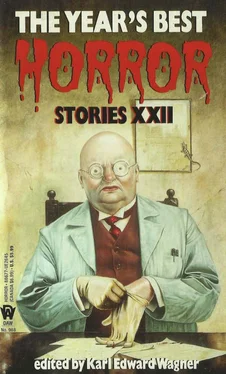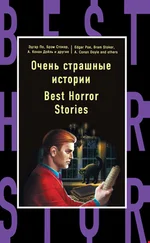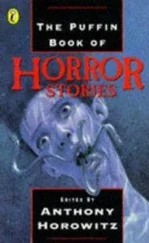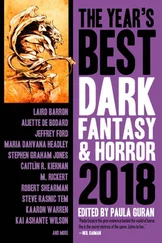The words dance.
Maybe she’s in the back room. The bedroom. Maybe the bastard dug her up. This is getting too weird for me. The old man points to the wash cloth on the table. “I live to wash her,” he says. He picks up the wash cloth. And laughs.
A LITTLE-KNOWN SIDE OF ELVIS
by Dennis Etchison
Don’t trust Dennis Etchison. He returned his contract with the closing comment: “I think ’94 is a definite improvement; hold that thought!” This was only a few days before the Big Quake in Los Angeles, centered not far from where he and his wife Kris live.
Born in Stockton, California on March 30, 1943, Etchison has been publishing strange short fiction since his callow youth. In recent years Etchison has edited the three-volume series, Masters of Darkness as well as two anthologies of original horror fiction, Cutting Edge and Metahorror . His own short fiction has been collected in The Dark Country , Red Dreams , and The Blood Kiss . Recently Dell/Abyss has published his novel, Shadowman , which will be followed by California Gothic and more.
Etchison’s short fiction fits my vague category of strange and disturbing—a handicap which kept him in obscurity throughout his early career. Times have changed.
Madding heard the dogs before he saw them.
They were snarling at each other through the hurricane fence, gums wet and incisors bared, as if about to snap the chain links that held them apart. A barrelchested boxer reared and slobbered, driving a much smaller Australian kelpie away from the outside of the gate. Spittle flew and the links vibrated and rang.
A few seconds later their owners came running, barking commands and waving leashes like whips.
“Easy, boy,” Madding said, reaching one hand out to the seat next to him. Then he remembered that he no longer had a dog of his own. There was nothing to worry about.
He set the brake, rolled the window up all the way, locked the car and walked across the lot to the park.
The boxer was far down the slope by now, pulled along by a man in a flowered shirt and pleated trousers. The Australian sheepdog still trembled by the fence. Its owner, a young woman, jerked a choke chain.
“Greta, sit!”
As Madding neared the gate, the dog growled and tried to stand.
She yanked the chain harder and slapped its hindquarters back into position.
“Hello, Greta,” said Madding, lifting the steel latch. He smiled at the young woman. “You’ve got a brave little dog there.”
“I don’t know why she’s acting this way,” she said, embarrassed.
“Is this her first time?”
“Pardon?”
“At the Dog Park.”
“Yes…”
“It takes some getting used to,” he told her. “All the freedom. They’re not sure how to behave.”
“Did you have the same trouble?”
“Of course.” He savored the memory, and at the same time wanted to put it out of his mind. “Everybody does. It’s normal.”
“I named her after Garbo—you know, the actress? I don’t think she likes crowds.” She looked around. “Where’s your dog?”
“Down there, I hope.” Madding opened the gate and let himself in, then held it wide for her.
She was squinting at him. “Excuse me,” she said, “but you work at Tri-Mark, don’t you?”
Madding shook his head. “I’m afraid not.”
The kelpie dragged her down the slope with such force that she had to dig her feet into the grass to stop. The boxer was nowhere in sight.
“Greta, heel!”
“You can let her go,” Madding said as he came down behind her. “The leash law is only till three o’clock.”
“What time is it now?”
He checked his watch. “Almost five.”
She bent over and unfastened the leash from the ring on the dog’s collar. She was wearing white cotton shorts and a plain, loose-fitting top.
“Did I meet you in Joel Silver’s office?” she said.
“I don’t think so.” He smiled again. “Well, you and Greta have fun.”
He wandered off, tilting his face back and breathing deeply. The air was moving, scrubbed clean by the trees, rustling the shiny leaves as it circulated above the city, exchanging pollutants for fresh oxygen. It was easier to be on his own, but without a dog to pick the direction he was at loose ends. He felt the loss tugging at him like a cord that had not yet been broken.
The park was only a couple of acres, nestled between the high, winding turns of a mountain road on one side and a densely overgrown canyon on the other. This was the only park where dogs were allowed to run free, at least during certain hours, and in a few short months it had become an unofficial meeting place for people in the entertainment industry. Where once pitches had been delivered in detox clinics and the gourmet aisles of Westside supermarkets, now ambitious hustlers frequented the Dog Park to sharpen their networking skills. Here starlets connected with recently divorced producers, agents jockeyed for favor with young executives on the come, and actors and screenwriters exchanged tips about veterinarians, casting calls and pilots set to go to series in the fall. All it took was a dog, begged, borrowed or stolen, and the kind of desperate gregariousness that causes one to press business cards into the hands of absolute strangers.
He saw dozens of dogs, expensive breeds mingling shamelessly with common mutts, a microcosm of democracy at work. An English setter sniffed an unshorn French poodle, then gave up and joined the pack gathered around a honey-coloured cocker spaniel. A pair of black Great Dane puppies tumbled over each other golliwog-style, coming to rest at the feet of a tall, humorless German shepherd. An Afghan chased a Russian wolfhound. And there were the masters, posed against tree trunks, lounging at picnic tables, nervously cleaning up after their pets with long-handled scoopers while they waited to see who would enter the park next.
Madding played a game, trying to match up the animals with their owners. A man with a crewcut tossed a Frisbee, banking it against the setting sun like a translucent UFO before a bull terrier snatched it out of the air. Two fluffed Pekingese waddled across the path in front of Madding, trailing colorful leashes; when they neared the gorge at the edge of the park he started after them reflexively, then stopped as a short, piercing sound turned them and brought them back this way. A bodybuilder in a formfitting T-shirt glowered nearby, a silver whistle showing under his trimmed mustache.
Ahead, a Labrador, a chow, and a schnauzer had a silkie cornered by a trash bin. Three people seated on a wooden bench glanced up, laughed, and returned to the curled script they were reading. Madding could not see the title, only that the cover was a bilious yellow-green.
“I know,” said the young woman, drawing even with him, as her dog dashed off in an ever-widening circle. “It was at New Line. That was you, wasn’t it?”
“I’ve never been to New Line,” said Madding.
“Are you sure? The office on Robertson?”
“I’m sure.”
“Oh.” She was embarrassed once again, and tried to cover it with a self-conscious cheerfulness, the mark of a private person forced into playing the extrovert in order to survive. “You’re not an actor, then?”
“Only a writer,” said Madding.
She brightened. “I knew it!”
“Isn’t everyone in this town?” he said. “The butcher, the baker, the kid who parks your car… My drycleaner says he’s writing a script for Tim Burton.”
“Really?” she said, quite seriously. “I’m writing a spec script.”
Oh, no, he thought. He wanted to sink down into the grass and disappear, among the ants and beetles, but the ground was damp from the sprinklers and her dog was circling, hemming him in.
Читать дальше












